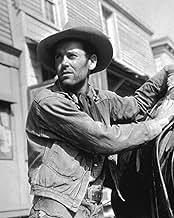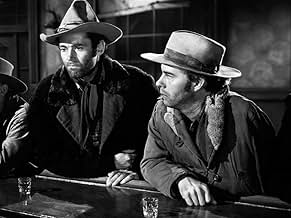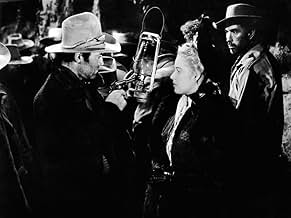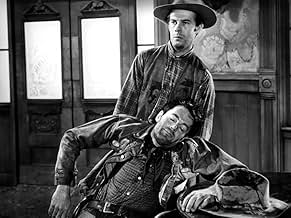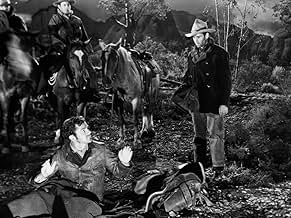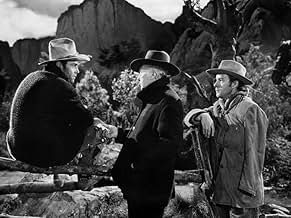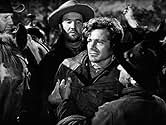Cuando un pelotón captura a tres hombres sospechosos de matar a un agricultor local, hay una fuerte división de opiniones entre ellos sobre si linchar o no a los hombres.Cuando un pelotón captura a tres hombres sospechosos de matar a un agricultor local, hay una fuerte división de opiniones entre ellos sobre si linchar o no a los hombres.Cuando un pelotón captura a tres hombres sospechosos de matar a un agricultor local, hay una fuerte división de opiniones entre ellos sobre si linchar o no a los hombres.
- Dirección
- Guionistas
- Elenco
- Nominado a 1 premio Óscar
- 9 premios ganados y 2 nominaciones en total
- Art Croft
- (as Henry Morgan)
- Posse Member
- (sin créditos)
- Bartlett
- (sin créditos)
- Dirección
- Guionistas
- Todo el elenco y el equipo
- Producción, taquilla y más en IMDbPro
Opiniones destacadas
Gil Carter & Art Croft ride into the town of Bridger's Wells, they hit the local saloon to imbibe after a log hard cattle drive. Whilst there a man runs in and announces that a popular man from the town has been shot by rustlers. The sheriff is out of town and a lynch mob quickly forms to bring what they see as swift justice to the culprits, Gil & Art join the posse so as to make sure they themselves don't get blamed for the shooting. The posse finds three weary workers and convince the majority that these guys are guilty and that instant hanging is the only way to do things. There are, however, one or two dissenting voices...
What a fabulous movie this is, a powerful indictment of how the lynch mob mentality can grip and lead to pain for many. William Wellman directs superbly, with a big ensemble in such a small area (Ox-Bow), he manages to get the right blend of emotive reactions from the leading players. Henry Fonda as Gill Carter is perfectly sedate and compassionate, even though he is far from being a flawless character, Dana Andrews as Donald Martin is heart achingly real, while others like Frank Conroy as Major Tetley are suitably full of ignorant bluster. It's quite an experience to see Wellman pull them all together with so much style. The photography from Miller is excellent, shadowy low tone black and white that is in keeping with the downbeat nature of the film, it infuses the picture with a gritty hard bitten noirish look. While Mockridge scores it suitably as sombre.
Ultimately it's the story that triumphs the most, claustrophobic in nature, it is simple yet tragic as it spins out to tell us how a group of seemingly sane individuals turned out to be a mass of incoherent reasoning. When a letter is read out during the finale, it is devastating in its effect, we see men broken, heads bowed in shame, others heavy in heart, their lives never to be the same. The emotional whack is hard hitting, and rightly so. For this is unashamedly a message movie, and a worthy one at that, so much so its reputation has grown over the years, where both the film and novel have made it into some educational curriculum's. It's very much a landmark Western, by choosing to forgo action for dark characterisations, it opened up the Western genre to being more than just shoot-outs and trail blazing. Had it been made seven or eight years later I think it would have garnered higher critical praise.
In spite of being one of Fonda's favourite movies that he made, the film didn't make money. The public were not quite ready for such sombre beats (Orson Welles, tellingly I feel, loved it), the critics of the time were irked by Wellman's decision to film the key trial and lynching sequences on the stage. Yet the closeness this gives the narrative serves it well, thrusting the many characters close together so they, and us, can see the whites of everyone's eyes, this is about focusing on the faces of those about to commit a capital crime. The close confines also gives off a pervasive sense of doom, where pessimism seeps through, there is no short changing here, the makers are dealing in bleakness and the right choices are made to produce one of the finest and most upsetting exponents of mob mentality played out on film. 9/10
The performances are all first rate--particularly HENRY FONDA as the not too bright drifter who opposes the lynching mob, Harry Morgan as his rather slow witted sidekick, Frank Conroy as the General with the weakling son (William Eythe), and most importantly, DANA ANDREWS, who has the most riveting role in the whole film and makes the most of it. His is the outstanding contribution, sensitive and gripping. The story is based on a true incident that happened in Montana in the late 1880s--and, of course, one that could have happened anywhere in the old West.
It's easy to see why it was not a commercial success. Except for Fonda, there are no other major stars in the cast for marquee value. Neither Dana Andrews nor Anthony Quinn had yet achieved star status. The story is grim and downright sobering, dwelling, as it does, on man's inhumanity to man. The Paul Hurst character, who makes various mocking gestures with his hangman's knot, adds to the grim gloominess of all the proceedings. Hurst (who played the Yankee deserter in GWTW) was almost always cast as a villainous lug.
The night scenes involving the hanging seem to take place on a studio soundstage but somehow it doesn't matter. Nothing distracts from the taut realism of the drama once we know that the lynching is definitely going to be carried out. Afterwards, the knowledge that the man they allegedly hanged is not dead, comes as a twist that drives home the senselessness of what their mob mentality has done.
Mary Beth Hughes has a decorative role as the only feminine interest in the film--except for an uncredited bit by Margaret Hamilton and an unusually grim and unsympathetic role for Jane Darwell.
Well worth watching, a message picture that delivers without being preachy. My only complaint is that the letter Fonda reads at the end could have been simpler and less eloquent for the sake of realism and in keeping with the naturalness of Dana Andrew's performance. Complementing Andrew's work is a nice, sympathetic performance by character actor Harry Davenport as the man who tries hard to prevent the hanging.
Otherwise, everything is right on the mark. Well worth watching.
The themes in the film are more prevalent and important than the plot itself. The film shows how rash decisions can out-shadow the truth, and this story can be likened to any number of stories over the last few centuries where the American value of 'innocent until proved guilty' has been overshadowed in favour of a crowd-pleasing decision. The tragedy of the film is always at the forefront, and this makes it difficult to aptly categorise this film as a western. Putting this film in with a genre of film that often focuses on gunfights and chase sequences somehow doesn't seem right. This film is really an ensemble drama, and in just a 72 minute running time, director William A. Wellman has managed to make a film that both intrigues and gives it's audience food for thought. Too many filmmakers these days think that a long running time is what makes a great film; but Wellman has proved that tight plotting and an important story are the far more important aspects. Henry Fonda is the biggest name on the cast list, and he does well; but even he struggles to shine amongst this film's real star, which is, of course, the script and the themes on offer. On the whole, this is a great film, which deserves more respect and shouldn't be missed by anyone!
¿Sabías que…?
- TriviaDirector William A. Wellman loved the novel "The Ox-Bow Incident" and had long wanted to make it into a film, but the rights-holders insisted that he cast Mae West in any adaptation, which Wellman thought was ridiculous. Finally, Wellman bought the rights himself, and proceeded to make the film "his" way.
- ErroresJuan Martinez throws a knife that lands right next to Farnley's foot. If you look closely you can see a thin wire attached to the end of the knife, indicating that first the scene was filmed with the knife being jerked backwards by the wire, then the film was played in reverse, to give the desired illusion of the knife landing at Farnley's feet.
- Citas
[Gil Carter reading Martin's letter]
Gil Carter: "My dear Wife, Mr. Davies will tell you what's happening here tonight. He's a good man and has done everything he can for me. I suppose there are some other good men here, too, only they don't seem to realize what they're doing. They're the ones I feel sorry for. 'Cause it'll be over for me in a little while, but they'll have to go on remembering for the rest of their lives. A man just naturally can't take the law into his own hands and hang people without hurtin' everybody in the world, 'cause then he's just not breaking one law but all laws. Law is a lot more than words you put in a book, or judges or lawyers or sheriffs you hire to carry it out. It's everything people ever have found out about justice and what's right and wrong. It's the very conscience of humanity. There can't be any such thing as civilization unless people have a conscience, because if people touch God anywhere, where is it except through their conscience? And what is anybody's conscience except a little piece of the conscience of all men that ever lived? I guess that's all I've got to say except kiss the babies for me and God bless you. Your husband, Donald."
- Créditos curiososAt the end of the credits an ad for U.S. war savings bonds is shown on the screen. It says that "15,000 movie theatres are now selling U.S. war savings stamps and bonds! Buy yours in this theatre."
- ConexionesFeatured in Film Extra: William Wellman (1973)
- Bandas sonorasRed River Valley
(uncredited)
Traditional
Played at the beginning and end of the film as well as at the camp site prior to the hanging
Selecciones populares
Detalles
Taquilla
- Presupuesto
- USD 565,000 (estimado)
- Tiempo de ejecución1 hora 15 minutos
- Color
- Relación de aspecto
- 1.37 : 1
Contribuir a esta página



